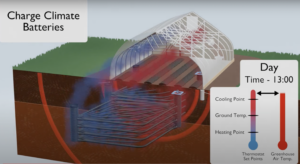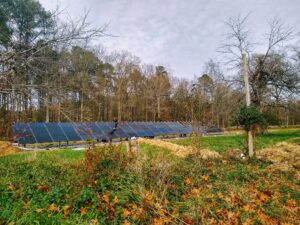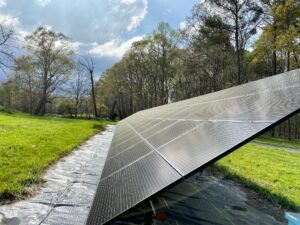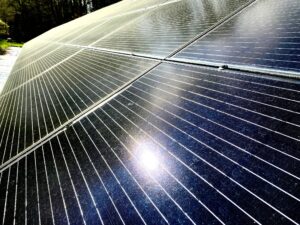Farms and Small Businesses Have Benefitted by Receiving REAP Funding with the Help of NCCETC
The USDA Rural Energy for America Program (REAP) provides grant funding and loan guarantees to agricultural producers and rural small businesses for renewable energy system (RES) and energy efficiency improvement (EEI) projects. The USDA recognizes the importance of both RES and EEI projects as a means to lower the burden of energy costs associated with operating farms and small businesses. Starting in FY 2023, the Inflation Reduction Act (IRA) directed additional funding to the USDA to expand REAP accessibility and increase levels of project funding to support clean energy advancements in rural areas throughout the United States. This includes establishing a separate pool of applicants seeking to install small projects requiring grants of $20,000 or less and adding points in the application scoring for projects that involve underutilized technologies. Eligible renewable technologies include solar, solar plus storage, wind, biomass, geothermal and hydrogen. Currently, all technologies except for solar are deemed as underutilized by the USDA.
Under the IRA funding, REAP offers grants up to $1 million for renewable energy systems and up to $500,000 for energy efficiency improvements. The federal share has been raised to 50% for energy efficiency projects, zero-emission renewable energy projects, and for projects in Designated Energy Communities as well as for federally recognized tribal entities. Designated Energy Communities are areas with a closed coal mine or coal-fired power plant, or areas that have been economically reliant on fossil fuels.
To be eligible, agricultural producers must be earning at least 50 percent of their gross income from agricultural operations. While agricultural producers can be located anywhere in the state (urban or rural), for a small business to be eligible, their location must be in a rural area, which is primarily defined as a city or town with a population of less than 50,000 residents. The USDA has an interactive map that can be used to determine property eligibility. Eligible small businesses include private – for profit corporations, partnerships or sole proprietorships as well as cooperatives, electric utilities that serve rural customers, and Tribal businesses and corporations.
Applicants compete for the pool of money allocated to each state based on criteria that includes:
- The quantity of energy that is generated, saved and/or replaced;
- Projects that have a good economic payback; and
- Projects that are located in a disadvantaged or distressed community.
The USDA has provided funding to NCCETC that allows the Clean Power and Industrial Efficiency (CPIE) team to support eligible facilities in North Carolina that are seeking funding through REAP with technical assistance and funding application support. Art Samberg, CPIE Program Director, says “This assistance is intended to help the applicant identify the appropriate renewable technology for a specific application, for which we then conduct an engineering assessment to determine technology viability, generation potential, project cost and projected savings and payback. Our CPIE team is also funded to provide support with the preparation of an application for funding the project through REAP. This helps ensure that the required forms are completed appropriately and accurately and that the key elements of the project are highlighted to optimize the scoring potential of the application.” The CPIE team has been successful in supporting agricultural producers and small businesses submit approved REAP grant applications.
Meredith Leight, owner of Granite Springs Farm in Pittsboro, NC, had a vision to implement a geothermal system that would efficiently heat and cool an existing greenhouse on her property. This type of technology was ideal to her, as a geothermal climate battery can store excess heat energy in the soil to be used at night or on cloudy days. Leight researched the technology for several years and purchased a plan for a climate battery from Atmos Greenhouse Systems.

Based on the information received, Leight submitted a REAP application to the USDA to fund her climate battery project. Following review of her application, the USDA requested additional information about the projected energy generation of the system. At the recommendation of the USDA Rural Development contact for North Carolina and the NC Extension Agent for Chatham County, Leight reached out to the CPIE team for assistance, approximately two weeks before the application due date. The CPIE team’s engineers coordinated with Leight and the USDA to prepare the requested energy calculations. This required the team to conduct a considerable amount of research to better understand how the Atmos Greenhouse System works, which included acquiring soil temperature data for Central North Carolina. Following this research, CPIE completed the calculations and forwarded the application supplement to both Leight and the USDA State Energy Coordinator. The calculations were approved by the USDA which allowed Leight to resubmit the complete REAP funding application by the June 30, 2023 deadline, leading to its approval.
One year later, Leight plans to begin the project later this summer. She says, “I’m very appreciative for the help that I got from the North Carolina Clean Energy Technology Center. I’m pretty sure I would not have gotten the REAP grant without them. I will definitely contact them again for future projects.”
Also located in Chatham County, Celebrity Dairy Farm and Inn requested the services of NCCETC to conduct an energy audit under the REAP program in 2018. They were interested in installing a ground mounted solar array and wanted to find out how much energy it would generate to offset their utility bills. Owner of Celebrity Dairy, Brit Pfann, said “getting the energy assessment audit was a great thing to do; knowing where things are gives you an idea of where to start fixing things.”
They went through the application process with the help of the CPIE team, and their project was approved in August 2019. In December of that year, contractors successfully installed the solar array.

Pfann is very happy with the new source of energy, saying his electricity bills have dropped by half, from around $1400 a month to $700. He says there is little complexity to the array, as they opted not to have a battery installed with it. The array is placed along the driveway to the farm, so that every visitor is aware of Celebrity Dairy’s commitment to sustainable practices.


The CPIE team has the expertise and the resources available to aid agricultural producers and rural businesses in every step of their journey to expanding energy independence and cost savings. To request technical assistance from NCCETC for a REAP assessment or for assistance with completing a REAP application, contact Art Samberg at asamber@ncsu.edu or at (919) 515-5959.